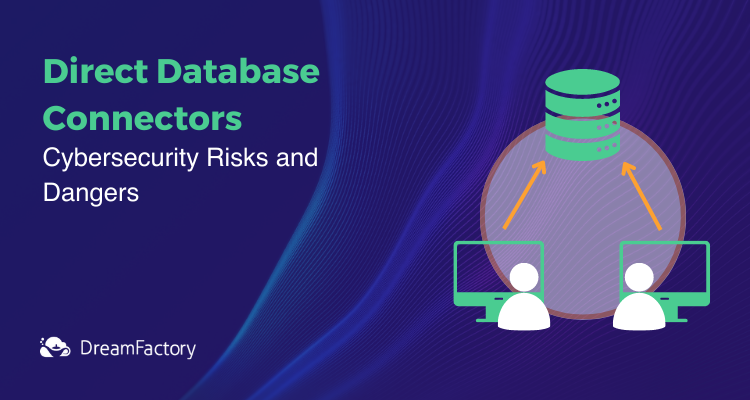
Direct database connectors or connections act as a middleperson between an app and a database, allowing the app to read, write, and alter data in the database without an API or other intermediary layer. While these connectors might be simpler to set up than creating and automating an API, making them valuable for database management, they pose several cybersecurity risks that could put your business at risk. Below, learn about these threats and how to mitigate them with an API management platform.
Why is Cybersecurity Important in Database Management?
Cybersecurity is critical when managing and altering databases because it minimizes or prevents data theft and loss. Your database, whatever type it is, most likely contains sensitive data such as personally identifiable information (PII) and intellectual property that you don't want people outside of your business to see. If that data falls into the wrong hands, you could jeopardize your business reputation and lose the trust of your customers, clients, and stakeholders.
Data theft and loss can also be expensive. Research shows a single cybersecurity attack — whether a data breach, DDoS attack, malware, ransomware, or something else — cost companies in the United States an average of $18,000 last year, an amount you probably can't afford. Moreover, 47% of all businesses in the U.S. suffered some kind of cyberattack in 2022.
Databases are particularly vulnerable to cybercrime, and not just because they contain highly sought-after personal data. Hackers can track network interfaces within a database if it's not encrypted, while database installations often come with additional and unnecessary packages that are never used, increasing the risk of attack surfaces.
Database security becomes a more challenging issue when using direct database connectors, which provide an easy way for applications to interact with a database.
What Cybersecurity Risks Do Direct Database Connectors Pose?
In short, direct database connectors provide users with direct access to a database, which can certainly be a good thing. You can read, write, and alter data in a database without coding a complicated API from scratch, which requires advanced development experience and lots of time and resources. However, without the security protocols an API provides, direct database connectors are sensitive to the following cybersecurity risks:
DoS Attacks
Denial-of-service attacks (DoS) and distributed denial-of-service attacks (DDoS) happen when cybercriminals infiltrate database connectors, causing a database to malfunction. Hackers might exploit a vulnerability in a connector and issue a command that confuses a database, causing it to crash and stop working properly.
SQL Injections
SQL injections happen when hackers enter malicious SQL into an app connected to a database, allowing them to access the database itself. Direct database connectors are often powerless against SQL attacks if users don't execute the correct security protocols.
Malware
Cybercriminals use direct database connectors to spread malware such as trojans and viruses and infiltrate data in a database. Ransomware, another type of malware, is becoming increasingly common in recent years. Hackers can infiltrate your database, render it immobile, and ask you to pay a ransom to regain access to your data.
Insider Threats
While all the above database security risks concern cybercriminals, insider threats are just as dangerous for your business. These threats typically originate from people inside your organization (“insiders”) who want to access your databases with malicious intent. For example, disgruntled employees might steal data from your systems through connectors and sell it to one of your competitors. Insider threats can also occur when negligent employees access databases through connectors and expose data by not following the correct IT protocols. Research shows insider incidents impact over 34% of businesses worldwide annually and have increased by 47% in the previous two years.
That's not to say connecting an app with a database using an API is 100% safe. You can still encounter cybersecurity risks if you design and deploy an API incorrectly — for instance, if you don't have much experience creating application programming interfaces. Using an API management platform reduces these risks significantly and frees up resources for your development team. The best platforms let you create APIs, including REST APIs, instantly, removing the need for complicated code and data engineering.
How API Management Platforms Add an Additional Layer of Security to Database Management
An API management or integration platform manages and centralizes all the tasks associated with creating and automating an API, including design, testing, documentation, deployment, and monitoring. You can forge connections between apps and the databases you use without any of the hard work.
API management platforms can reduce cybersecurity risks through:
Authentication
The best API management platforms provide authentication protocols that prevent unauthorized users from accessing your valuable data. You can create permissions and access controls for employees based on their roles and responsibilities and block lower-level employees from accessing information they don't need. Specific access management protocols depend on the platform but might include multi-factor authentication, OAuth 2.0, API access tokens, and API keys that only allow privileged users to access your database.
Security updates
API management platforms patch APIs with the most recent security features and fixes, reducing the risk of cybercrime. Most platforms will install security updates automatically, ensuring your APIs are secure and fully functional all the time.
Encryption
One of the most important cybersecurity protocols for database management is encryption. API management software tools encrypt the data shared between a client and database server, protecting all the sensitive information in your system of choice. Communication protocols, such as SSL and HTTPS, encrypt your data according to the latest security standards.
Monitoring
Some API management platforms continue to monitor the security of your APIs after creating and automating them. You can view real-time analytics about the state of your APIs and identify any cyberthreats and vulnerabilities that might impact their functionality or security. API auditing reports provide the latest intelligence about your APIs and how they perform, as well as information about security risks and security controls. Share these reports with your security teams.
How Direct Database Connector Cybersecurity Risks Damage Your Business
Never underestimate the impact of a cybersecurity attack on your business. If hackers exploit direct database connectors to access your database, you could experience the following challenges:
Financial Issues
Data breaches and other information security events that arise from direct database connectors can cause financial damage to your business. Financial losses might occur during database downtime, which prevents your team members from doing their day-to-day jobs. Downtime makes it difficult for employees to resolve customer queries, take orders, and access customer information. Even if your database is only down for a brief period, you could lose out on revenue, impacting your bottom line.
Legal Issues
Wide-scale security breaches that expose sensitive customer data in a database, such as credit card and Social Security numbers, could result in lawsuits. Customers might take you to court for damaging their financial reputations if hackers post their details online. A lawsuit will not only cost you money but can also damage your reputation, resulting in customers losing trust in your business.
Data Governance Fines
Depending on your industry or region, you might need to comply with data governance legislation like GDPR, HIPAA, or CCPA. All these laws stipulate the need to protect sensitive data, like the information in your database, from cybercriminals.
There are several ways you can mitigate the risks of cybersecurity events from direct database connectors:
- Create an incident response plan that tells your employees what to do in the event of a data breach or other cybersecurity incident. Your plan might include security policies for keeping your business running after hackers infiltrate your database, such as using an alternative system.
- Train employees to identify potential security threats. For example, team members can learn the warning signs of a phishing or social engineering attack, which can happen when cybercriminals trick employees to hand over sensitive information that might grant them access to your database.
- Employ pen-testing. Pen-testing, or penetration testing, involves IT experts carrying out a simulated attack on your database to evaluate its security. Penetration testing and other risk management measures can ensure your database is resilient against different cybersecurity attacks, making it one of the most effective security best practices.
Failing to adhere to these rules might result in expensive fines for data governance non-compliance, which, in some cases, can exceed tens of thousands of dollars.
Mitigating the Cybersecurity Risks of Direct Database Connectors
While direct database connectors are an easy way to sync an app with a database, they could put your business at risk. These connectors increase the chances of malware, DDoS attacks, SQL injections, and other events that jeopardize your reputation, cause financial losses, and result in lawsuits and data governance non-compliance. Creating an API to connect apps with your database will increase cybersecurity but only if you know what you’re doing. Using an API management platform is the best way to prevent cybercrime and protect the most valuable data in your organization.
DreamFactory is an API management platform that lets you create secure and compliant APIs instantly, including REST APIs. Start your free 14-day trial and let DreamFactory create and automate APIs for your database?
Related Reading:
As a seasoned content moderator with a keen eye for detail and a passion for upholding the highest standards of quality and integrity in all of their work, Spencer Nguyen brings a professional yet empathetic approach to every task.
























 Blog
Blog
